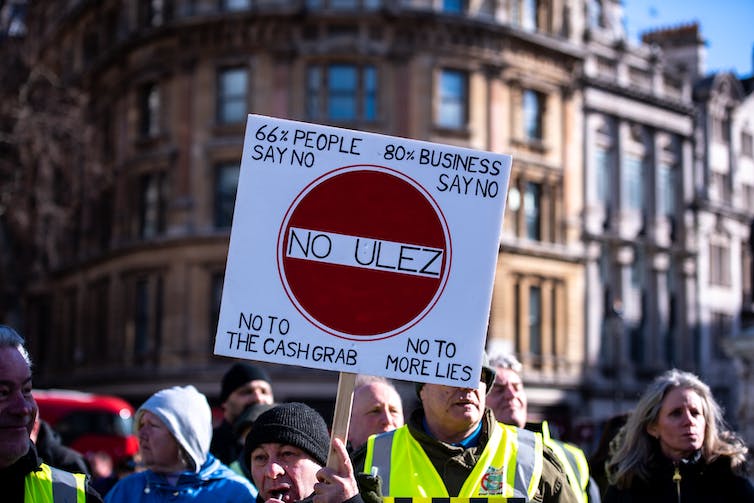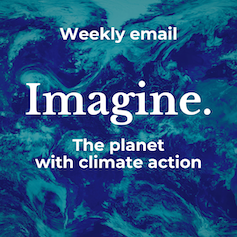Expanding London’s Ulez has sparked fractious debate – psychologists explain how it can be de-escalated

Drivers of the most polluting vehicles are now charged £12.50 a day (or more for heavier vehicles) to drive within London’s M25 orbital motorway, following an expansion to the city’s ultra-low emission zone (Ulez) in August 2023.
Something had to be done. A report published by the Greater London Authority earlier in the year found that every London borough exceeds the World Health Organization’s limits for toxic air pollution.
But critics argue that the change will make life unaffordable for some Londoners. And there are question marks surrounding whether it will have a significant impact on improving air quality anyway.
Read more:
London air pollution: expanding the ULEZ is good but it won’t work by itself
The Ulez expansion has caused particularly acrimonious controversy, leading to polarised and impolite exchanges on the Facebook page of London’s Mayor, Sadiq Khan. Comments on the main announcement included harsh criticisms like “you need to be serving the people not your global overlords”, to personal attacks, including “you are a racist and a liar. And karma is a real thing”.
There were over 1,200 comments, many of which had a similar tone. Clearly there is some way to go concerning constructive debate on social media.
The Mayor of London, Sadiq Khan.
B. Lenoir/Shutterstock
But there is more to this story than just online comments. Instances of violence have included criminal damage to Ulez cameras and clashes between the police and protesters.
Disagreement is a natural part of a healthy democratic society that fosters diverse viewpoints. Nevertheless, the intensity and bitterness seen in modern debates, including those surrounding London’s expanded Ulez, can be emotionally taxing. Understanding the nature of disagreement may help inform ways to resolve it.
The study of disagreement can be traced back to ancient Greece, where Aristotle introduced the idea that persuasion has three elements. Modern psychologists have arrived at a similar understanding. They have identified three types of disagreement.
These types of disagreement can be conflated, which may be counterproductive in the context of London’s expanded Ulez.
1. Values
The first type of disagreement arises from differences in personal values. In the context of Ulez, this could manifest as a clash between someone who values the importance of clean air versus another who feels that the health benefit does not justify the economic burden for those who have no option but to drive within the zone.
Disagreement that is rooted in differing values can be hard to resolve. This is because the general principles embodied in values ultimately reflect personal choices, and why should one person’s personal choice be deemed better than another’s?
The other ways to disagree depend on an idea that psychologists call dual process theory. According to this theory, thinking has two modes: system 1 (quick and emotional) and system 2 (measured and analytical).
2. Emotions
The second source of disagreement relates to system 1 thinking. This type of thought is fast, reflexive and intense – and can be influenced by emotions.
There is plenty of evidence in psychology that emotion can bias the process of arguing and reasoning, and even overwhelm objective information. For example, a committed environmentalist could continue to enjoy meat consumption, despite having a rational understanding of its environmental impact.
The introduction of Ulez potentially raises issues that are deeply emotional for many people. Disagreement based on emotion typically cannot be resolved, since how we feel about an issue is also a personal matter.
3. Facts
The third source of disagreement relates to system 2 thinking. This refers to reflective and deliberate thought, where a person is critical, analytical, and tries to solve a problem in a logical manner.
System 2 disagreement is based (more or less) on factual information, which can be independently established. So, two parties should be able to agree on the relevant facts in order to reach a resolution.

February 2023: Protestors at a ULEZ Protest in Trafalgar Square, London.
Loredana Sangiuliano/Shutterstock
However, the real problem is that these sources of disagreement are often conflated, especially in public debate forums. Research shows that when dealing with controversial decisions, people with extreme views are often more confident and therefore more likely to publicly comment.
As a result, arguments that are based on values or emotions might be more visible than those that are based on facts or logic. This, in turn, leads to increasing polarisation in public discourse. It could also give the impression that a debate is more fractious than it really is.
All of these problems appear to be particularly troublesome for Ulez and the wider debate on climate change.
The path to constructive debate
Discussion that is grounded in values and emotion can be valuable. These key parts of our human identity play a pivotal role in morality-based decision making. However, as psychologists, we believe that both individual people and society could benefit from more deliberative and fact-based thinking when dealing with controversial matters.
Regarding Ulez, fact-based exchanges should focus on questions like whether the expanded Ulez is expected to make a sizeable impact on air quality, and if there are sufficient support mechanisms for those who may be affected but lack the financial means to replace their vehicles.
There is a lot to be gained by recognising these different influences on disagreement. But emotions and values, for all their importance in our life, should complement and not fully replace an analytical outlook.

Don’t have time to read about climate change as much as you’d like?
Get a weekly roundup in your inbox instead. Every Wednesday, The Conversation’s environment editor writes Imagine, a short email that goes a little deeper into just one climate issue. Join the 20,000+ readers who’ve subscribed so far.







